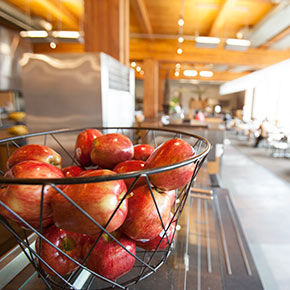Winter Health Tips for Your Student

By Libby Andersen, ARNP, and Iona Parker, ARNP, SPU Health Services
Here are tips to help keep your student healthy this winter season:
- Encourage regular sleep. Students enjoy the freedom of establishing their own schedule, which can mean late nights. Establishing a regular bedtime to get seven to eight hours of sleep per night promotes general health, helps us heal from illness, and improves concentration throughout the day.
- Eat a well-balanced diet. Many students wake up late, rush from one class to the next, skipping breakfast or lunch. Quick foods to eat while on the run are often full of carbohydrates and lack protein. Teach your student the importance of eating regular meals with protein, fresh fruits, and veggies.
- Encourage exercise. Regular activity increases the circulation of antibodies and white blood cells that fight infection. The deep breaths we take during exercise flush bacteria out of our lungs. Stress increases our risk of infection, making exercise all the more important.
- Take vitamin D. Low vitamin D can contribute to the winter blues. Our bodies naturally make vitamin D in the sunshine; however Seattle does not see much sun through the winter months. Supplementing with 2,000 IU of vitamin D can ease fatigue and low mood in the winter.
- Wash hands. What is the easiest way to stay healthy? Wash your hands -- especially before you eat! Encourage your student to avoid touching his or her eyes, mouth, or nose. Nail-biting or chewing on the ends of pens and pencils transmits infection.
- Gargle with salt water. This easy tip can help prevent a variety of upper-respiratory infections. Adding a half teaspoon of salt to 8 ounces of warm water, then gargling two to three times per day, can prevent infections and hasten healing when your student gets sick.
- Drink water. Hydration supports the body’s ability to fight off infection. Dehydration can be caused by fevers, salty diets, and caffeine. Recommend sipping on a water bottle throughout the day.


